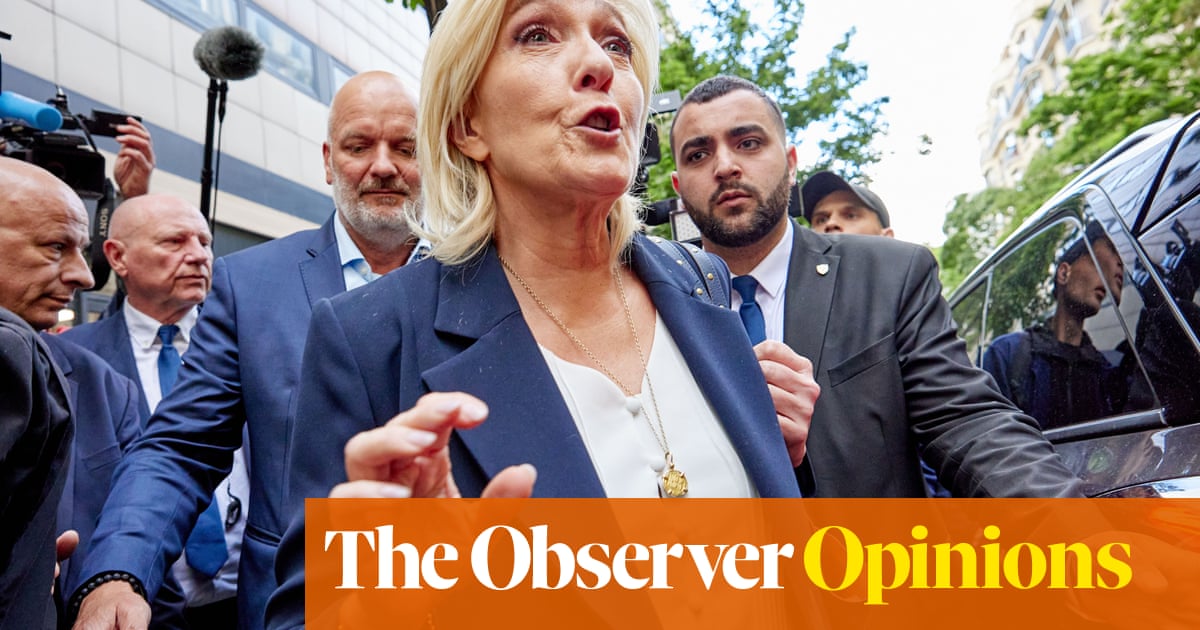Far right? Hard right? Radical right? Or just plain right? The success in the recent EU elections of parties such as Marine Le Penâs Rassemblement National, or RN, (the rebadged Front National), and Germanyâs Alternative für Deutschland (AfD), has generated a debate about whether the label âfar rightâ should be retired because, as Spectator editor Fraser Nelson argues, many parties that carry that moniker are ânow mainstream in a way that wasnât the case 15 years agoâ.
Such parties are, for Nelson, better categorised as ânew rightâ. Italian prime minister Giorgia Meloni, whose party the Brothers of Italy is descended from a fascist organisation, has shown in practice that âshe is centre-right, not radicalâ. It is ânonsenseâ, Nelson insists, âto call Meloniâs party âpost-fascistâââ or to suggest that the disparate ânew rightâ parties all belong to a single âââfar-rightâ or radical-right lumpâ.
It is true that the term âfar rightâ is thrown around too promiscuously and that, in power, far-right politicians often rule not like latter-day Mussolinis but rather as technocrats with a reactionary edge. What is missing from this argument, though, is the recognition that the mainstreaming of the far right should raise questions about the character not just of the far right but of the mainstream, too.
Organisations termed âfar rightâ comprise, as Jon Bloomfield and David Edgar note in a new polemical critique of the âpopulist rightâ, at least three distinct lineages. First, there are the âunashamed neo-fascist partiesâ, such as Germanyâs The Homeland, or NPD, and Golden Dawn in Greece. These may pose a threat on the streets but have little popular support.
Then there are the âfascist successor partiesâ, organisations that developed out of old fascist parties, including Meloniâs Brothers of Italy and Franceâs RN, many of whom have striven to âdetoxifyâ themselves in search of electoral success. Finally, there are new parties such as the AfD, founded in 2013 as an anti-EU organisation and described at the time as the âparty of the professorsâ and a âbourgeois party of protestâ because of the number of academics on board, and Geert Wildersâ Party for Freedom (PVV), created in the Netherlands in 2006 to oppose immigration and Islam, which triumphed in last yearâs general election.
The burgeoning success of far-right or ânew-rightâ parties does not herald the march of jackboots, or a return to 1930s fascism. The fascist parties of the interwar years emerged at a time of fierce class conflict and of violent confrontation between capital and labour. Todayâs ânew rightâ has been nurtured by almost the reverse social conditions.
Over the past 40 years, working-class organisations have disintegrated, class conflict has become less overt and large sections of the public have become disengaged from the political process. At the very time that economic and social developments, from the casualisation of work to the imposition of austerity, have made working-class lives so much more precarious, social democratic parties have moved away from their traditional working-class constituencies, leaving many feeling politically voiceless.
Meanwhile, the politics of class has given way to the politics of identity, and class itself has come to be seen not so much a political or economic category as a cultural, even racial, attribute. Politicians and journalists often talk now about the âwhite working classâ but rarely about the âblack working classâ or the âMuslim working classâ, even though a far greater proportion of black people and Muslims are working class.
Instead, commentators such as Matthew Goodwin, an academic researcher into rightwing populism who has now turned into an advocate for it, imagine an âinformal alliance between white elites, corporations and minorities against the white working classâ, thereby both excluding minorities from the working class and playing on white victimhood. All this has opened the way for reactionary movements to reshape politics by linking a bigoted form of identity politics, rooted in hostility to migrants and Muslims, to economic and social policies that were once the staple of the left: defence of jobs, support for the welfare state, opposition to austerity.
In practice, ânew rightâ politicians advocate measures deeply inimical to working-class interests, from attacks on civil liberties to curbs on trade union rights. But as social democratic parties have abandoned the working class, so large sections of the working class have abandoned social democratic parties and many have sought refuge within the parties of the radical right.
Mainstream politicians, panicking about such political realignment, have appropriated many far-right themes. From the mass detention and deportation of undocumented migrants to the insistence on offshore processing, measures once advocated only by those on the political fringe have become policy. Far-right tropes, such as the âgreat replacementâ â a conspiracy theory that the elites are replacing white Europeans with migrants â and fears about the falling birthrates of âindigenousâ Europeans, are now recycled by respectable figures on the mainstream right.
âThe positions which were once condemned, despised, looked down upon and treated with contempt are becoming jointly held positions,â the Hungarian prime minister, Viktor Orbán, a political icon for many on the ânew rightâ, told reporters in 2016. âAnd people who stand up for these positions are today being welcomed as equal partners.â Eight years on, that is even more true.
after newsletter promotion
When Ursula von der Leyen was elected president of the European Commission in 2019, one of her first acts was to rebadge the vice-president responsible for migration policy as the âcommissioner for promoting our European way of lifeâ, making clear her sense that migrants posed an existential threat to European culture and identity. Von der Leyenâs move, Le Pen gloated, âconfirms our ideological victoryâ.
There is, many critics insist, nothing âfar rightâ or âracistâ about wanting to restrict immigration or in raising concerns about radical Islamists. That is true. There is, though, something profoundly pernicious about demonising immigrants, describing asylum seekers as constituting an âinvasionâ, castigating Muslims as being incompatible with western societies, obsessing over London becoming a âminority whiteâ city, claiming that immigration has led Britons into âsurrendering their territory without a shot being firedâ, fearing that Europe is âcommitting suicideâ. These are far-right themes now advanced by mainstream intellectuals and politicians.
If the label âfar rightâ seems redundant to some these days, that is largely because arguments that once were the staple of the political fringe now nestle at the heart of mainstream debate.
Kenan Malik is an Observer columnist
-
Do you have an opinion on the issues raised in this article? If you would like to submit a letter of up to 250 words to be considered for publication, email it to us at [email protected]



